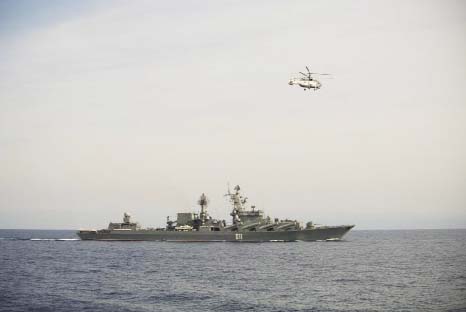
AP, Onboard The Vice Admiral Kulakov :
Russian warships equipped with an array of long-range missiles cruise off Syria’s coast to back the air campaign in Syria and project Moscow’s naval power worldwide.
The military demonstrated its might on Thursday by inviting a group of Moscow-based reporters on board the Vice Admiral Kulakov destroyer, which sailed alongside the flagship of the Russian naval group, the Varyag missile cruiser.
By establishing a long-term presence in the eastern Mediterranean, the Russian military has revived a Soviet-era capability to project naval power far from its borders.
The display of Russia’s military operations came before planned peace talks between the Syrian government and opposition next week in Geneva, which are meant to pave the way for a political settlement for Syria. Since Russia launched its bombing campaign in Syria on Sept. 30, its warplanes have flown more than 5,700 missions in support of Syrian government troops.
The warships, accompanied by support vessels, have rotated on duty off Syria’s shores, reviving a Soviet-era practice when Soviet warships maintained a permanent vigil in the Mediterranean.
The Varyag has sailed from its Pacific port, while the Vice Admiral Kulakov has come from the Russian base of Severomorsk on the Kola Peninsula.
The bigger cruiser carries long-range anti-ship missiles and powerful air defense systems used to help protect the Russia air base and the warplanes operating from it.
The destroyer is armed with an array of anti-ship cruise missiles, torpedoes and anti-aircraft weapons, but its main mission is hunting for enemy submarines.
“My ship is in eastern Mediterranean to protect and defend other ships and cargo vessels and to provide search and rescue at sea if necessary,” said Capt. 1st Grade Stanislav Varik, the commander of the destroyer.
He emphasized that his ship is optimized for engaging submarines, and added that his crew had successfully tracked several foreign submarines during its stint in the eastern Mediterranean.
“There are submarines belonging to several nations here, and we have spotted, identified their class and tracked some of them,” he said without offering further details.
The Russian naval facility in the Syrian port of Tartus has served as the key supply and support point since Soviet times. It is now the only such facility outside the former Soviet Union.
Russian warships come here for refueling and get other supplies, and some get minor maintenance there.
The Varyag, the flagship of the navy’s Pacific Fleet, has replaced its sister ship, the missile cruiser Moskva on a stint near Syria. The cruisers are equipped with long-range Fort air defense missiles, the navy equivalent of the famous S-300 Russian air defense systems.
Like the Moskva earlier, the Varyag has kept close to the shore to help protect Russian warplanes after Turkey downed a Russian jet in November.
Russian warships equipped with an array of long-range missiles cruise off Syria’s coast to back the air campaign in Syria and project Moscow’s naval power worldwide.
The military demonstrated its might on Thursday by inviting a group of Moscow-based reporters on board the Vice Admiral Kulakov destroyer, which sailed alongside the flagship of the Russian naval group, the Varyag missile cruiser.
By establishing a long-term presence in the eastern Mediterranean, the Russian military has revived a Soviet-era capability to project naval power far from its borders.
The display of Russia’s military operations came before planned peace talks between the Syrian government and opposition next week in Geneva, which are meant to pave the way for a political settlement for Syria. Since Russia launched its bombing campaign in Syria on Sept. 30, its warplanes have flown more than 5,700 missions in support of Syrian government troops.
The warships, accompanied by support vessels, have rotated on duty off Syria’s shores, reviving a Soviet-era practice when Soviet warships maintained a permanent vigil in the Mediterranean.
The Varyag has sailed from its Pacific port, while the Vice Admiral Kulakov has come from the Russian base of Severomorsk on the Kola Peninsula.
The bigger cruiser carries long-range anti-ship missiles and powerful air defense systems used to help protect the Russia air base and the warplanes operating from it.
The destroyer is armed with an array of anti-ship cruise missiles, torpedoes and anti-aircraft weapons, but its main mission is hunting for enemy submarines.
“My ship is in eastern Mediterranean to protect and defend other ships and cargo vessels and to provide search and rescue at sea if necessary,” said Capt. 1st Grade Stanislav Varik, the commander of the destroyer.
He emphasized that his ship is optimized for engaging submarines, and added that his crew had successfully tracked several foreign submarines during its stint in the eastern Mediterranean.
“There are submarines belonging to several nations here, and we have spotted, identified their class and tracked some of them,” he said without offering further details.
The Russian naval facility in the Syrian port of Tartus has served as the key supply and support point since Soviet times. It is now the only such facility outside the former Soviet Union.
Russian warships come here for refueling and get other supplies, and some get minor maintenance there.
The Varyag, the flagship of the navy’s Pacific Fleet, has replaced its sister ship, the missile cruiser Moskva on a stint near Syria. The cruisers are equipped with long-range Fort air defense missiles, the navy equivalent of the famous S-300 Russian air defense systems.
Like the Moskva earlier, the Varyag has kept close to the shore to help protect Russian warplanes after Turkey downed a Russian jet in November.

